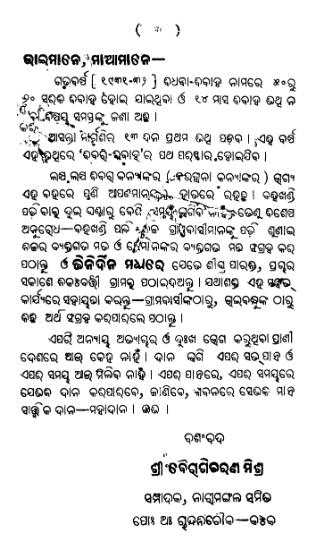In 1933, Odisha’s literary landscape was enriched by the publication of Bibara Bibaha (translated as The Essence of Marriage) by Bairagi Charana Misra. This seminal work stands out as a profound exploration of the institution of marriage, weaving together philosophical insights, cultural reflections, and social commentary. Through this essay, Misra addresses the complexities of marital relationships, offering readers both a mirror to society and a guide to navigating the intricate dynamics of partnerships.
Bibara Bibaha is notable for its multifaceted approach to the concept of marriage. Misra presents marriage as not merely a social contract but as a sacred bond that intertwines the lives of individuals. He delves into various dimensions of marriage, emphasizing its significance in the socio-cultural fabric of Odisha. The essay reflects on traditional values while also engaging with contemporary perspectives, showcasing the poet’s depth of understanding regarding the evolving nature of relationships.
One of the key themes in Bibara Bibaha is the idea of companionship. Misra articulates the belief that marriage should foster mutual respect, support, and love between partners. He emphasizes that a successful marriage is rooted in partnership rather than ownership, encouraging individuals to view their spouses as equals. This perspective was particularly progressive for his time, challenging conventional notions that often viewed marriage through a more rigid and hierarchical lens.
Misra’s essay also addresses the challenges that couples may face in their journey together. He candidly discusses issues such as communication, conflict resolution, and the need for compromise, recognizing that every relationship undergoes trials. His insights advocate for openness and dialogue, underscoring the importance of understanding and empathy in maintaining a harmonious marriage. This focus on personal growth and emotional intelligence contributes to the timeless relevance of his work, as many readers today can relate to the dilemmas and solutions he presents.
Furthermore, Bibara Bibaha reflects on the societal expectations surrounding marriage, particularly those that affect women. Misra critiques the traditional roles assigned to spouses and calls for a more equitable distribution of responsibilities. His observations highlight the necessity for both partners to engage in shared decision-making, thereby promoting gender equality within the domestic sphere. By addressing the broader implications of marriage on individual identities and societal norms, Misra’s work resonates with the transformative movements toward gender justice that have emerged in subsequent decades.
The language of Bibara Bibaha is another aspect that deserves mention. Misra writes with clarity and elegance, employing a style that is engaging and thought-provoking. His ability to articulate complex ideas in accessible language makes the essay not just an academic discourse, but a relatable narrative that speaks to anyone contemplating the nature of marriage. Through his eloquence, Misra captures the nuances of love, commitment, and partnership, inviting readers to reflect on their own experiences.
Books Info
| Books name | Bibara Bibaha / ବିବରା ବିବାହ |
| Author | Bairagi Charana Misra |
| No Of pages | 10 |
| Publisher | NA |
| Publication | 1932 |
| Printed At | NA |
| Distributor | NA |

